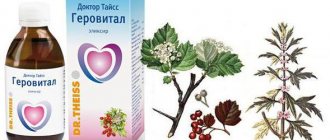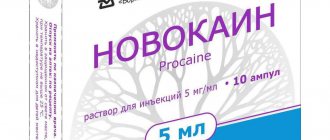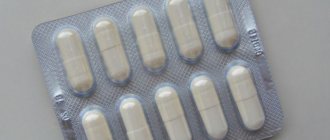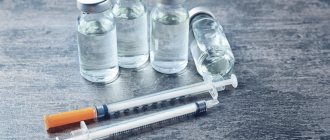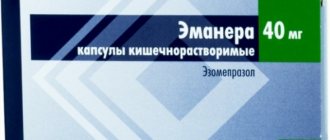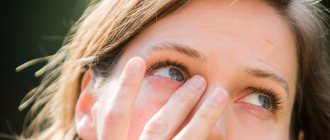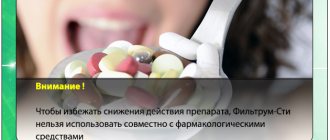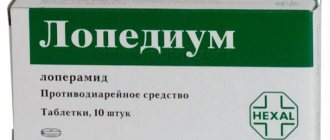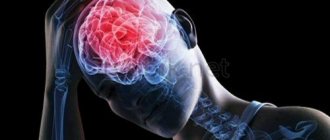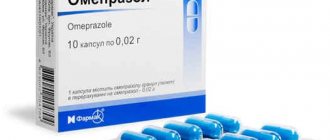Mechanism of action
The drug Colchicine contains an alkaloid obtained from the corms and seeds of a poisonous plant called crocus (meadow saffron).
The molecule of the main active substance contains 3 hexameric rings, one of which has the ability to bind to tubulin inside cells and block its further transformation into microtubules. These tubular formations are the basis of the cytoskeleton and are also necessary for cell movement. By acting on microtubules, Colchicine suppresses the ability of neutrophils (one of the types of leukocytes) to migrate to the site of damage or inflammation, neutralizing one of the mechanisms of the inflammatory process.
The effect of Colchicine on leukocyte migration is not limited to preventing the formation of the cytoskeleton. The drug also affects the ability of white blood cells to adhere to the endothelium (the inner lining of blood vessels) and penetrate through its intercellular gaps into the surrounding tissue. Due to this, the number of leukocytes migrating through the vascular wall to the site of gouty inflammation and located in the synovial fluid inside the affected joints is significantly reduced.
The drug belongs to the group of anti-gout drugs used in acute gouty arthritis for the rapid and careful relief of gout attacks. This is the first clinical manifestation of the disease, characterized by the following clinical picture:
- sudden (often at night) appearance of severe pain in the area of the big toe of the lower limb, elbows, ankle, knee or hand;
- inflammation, swelling of the damaged joint;
- redness of the skin in this place, it becomes shiny, glossy, later dries out and flakes;
- chills, burning of the affected area, fever, sometimes reaching 39-40 degrees.
The attack lasts several days. Even the slightest touch to the sore joint causes excruciating pain, which makes walking difficult. Colchicine is an emergency drug. Its pharmacological properties appear only in gouty arthritis. This feature allows the drug to be used as a differential diagnostic test confirming the presence of this particular type of disease. Taking Colchicine improves the condition of patients suffering from joint disease caused by gout - the deposition of uric acid salts:
- in 5%, pain disappears within the first hours after the start of therapy;
- in 75%, the therapeutic effect is observed after 10-12 hours, reaching a maximum after 24-48 - pain and swelling of the joints sharply subside;
- selectively suppresses inflammation caused by crystalline uric acid salts deposited on the surface of articular structures;
- moisturizes, softens the epidermis, reduces the severity of skin manifestations;
- prevents the progression of the disease, prevents relapses of acute attacks.
Colchicine also
- directly affects the metabolism of uric acid in the body;
- reduces lactate levels;
- normalizes acid-base balance in tissues;
- helps reduce crystal formation in tissues.
Another important component of the mechanism of action of Colchicine is its effect on the secretion of lysosomal enzymes by neutrophils - substances that, during inflammation, contribute to the melting of tissues. The drug also suppresses the release of interleukins and the release of histamine from mast cell granules, reduces the production of immunoglobulins and inhibits cellular immune responses.
As a result of all these processes, the severity of the inflammatory reaction quickly and quite significantly decreases, which allows the use of
Colchicine as an effective medicine for gout .
In addition, disruption of the formation of microtubules and fibrils under the influence of this drug can change the speed of transmission of nerve impulses, prevent the formation of amyloid threads and fibrosing processes in various tissues. Therefore, Colchicine can be used for some other diseases. It should be taken into account that the severity of the general anti-inflammatory effect of this drug is significantly lower than that of NSAIDs. The effects are dose-dependent; increasing the dose leads to the manifestation of a universal cytotoxic effect with suppression of mitosis (one of the phases of division) of cells of various tissues.
When is Colchicine indicated?
Preparations from colchicum alkaloids have been known for a long time. They have been used to treat acute and chronic arthritis of various etiologies, amyloidosis, sarcoidosis, cutaneous vasculitis, Behcet's disease and many other conditions.
Taking into account cytotoxicity, you should not unauthorizedly use the drug to treat conditions not specified in the instructions for use. The drug should be taken only as prescribed by a doctor, following the therapy regimen recommended by him.
Research to determine the clinical effects of Colchicine is ongoing.
Indications for use of Colchicine:
- relief of an acute gout attack or exacerbation of a chronic gouty process;
- prevention of recurrent gout attacks;
- relief of other acute attacks of chondrocalcinosis;
- periodic illness (familial Mediterranean fever);
- Behçet's disease.
In some cases, the doctor may decide to prescribe Colchicine for primary biliary cirrhosis, progressive systemic sclerosis, amyloidosis, inflammatory diseases of the ENT organs and dental pathology.
Indications
Colchicine is prescribed for:
- gout – to prevent or prevent acute attacks;
- gouty arthritis, scleroderma, chondrocalcinosis;
- certain forms of phlebitis, inflammatory diseases in dentistry and otolaryngology;
- familial Mediterranean fever, amyloidosis.
Release forms and composition
Colchicine is produced in the form of round tablets containing 0.5 or 1 mg of the active ingredient, although there is the possibility of intravenous administration of a diluted and strictly dosed extract from colchicum. But in clinical practice, tablets are used, which makes it possible to standardize the treatment regimen and makes it possible to treat on an outpatient basis. It is a white powder that decomposes and darkens in light. The tablets are coated with a special acid-resistant coating, which helps the medicine not to linger in the stomach for a long time, but having safely passed it, enter the small intestine, where it is absorbed more quickly. They are sealed in sealed blisters, packed in a cardboard box. Available in 10, 20, 50, 60 or 100 pieces.
As Colchicine's instructions for use indicate, the only active ingredient of the drug is synthetically obtained from the dry extract of Colchicine autumnale; the medication does not contain any other additional components. The closest analogue of Colchicine, found in many pharmacies, Colchicum-dispert, also contains a number of excipients:
- microcrystalline cellulose, povidone, copovidone - absorb harmful substances coming from outside or formed in the body and remove them from the intestines;
- shellac, sucrose – glaze for coating tablets;
- corn starch – binder, thickener;
- lactose (milk sugar), magnesium stearate, gum arabic, talc - food additives, emulsifiers, fillers, etc.
There are drugs containing the active substance - Colchicine, in the form of a solution for intravenous injection. Sold in glass ampoules (0.5 mg/1 ml). These are fast-acting, effective drugs, but often cause serious side effects, including fatal cases. In many countries, intravenous administration of Colchicine is not recommended.
Reviews and recommendations from doctors and patients
The drug Colchicine is characterized as one of the best drugs for the treatment of gout. It is suitable not only for treatment, but also for prevention.
When taking this remedy, you must strictly follow the recommended dosage, since the active substance of the tablets is an alkaloid.
Doctors recommend strictly following the instructions, avoiding overdose and combining Colchicine with a number of drugs.
Patients note the effectiveness of the drug in combating pain and restriction caused by gout. For some, taking this medication has caused adverse reactions.
Dosage and method of administration
Single dosages and duration of therapy depend on the severity of the disease, clinical form, dynamics and nature of the manifestation of gout. The exact values are set individually, incl. taking into account the presence of renal or liver failure. In this case, to avoid intoxication, reduced doses of Colchicine are prescribed. If the inflammatory process develops and there is an acute attack, you should start taking the medicine as early as possible. It is recommended to adhere to the following scheme:
- initial dose – 1 mg (1-2 tablets);
- thereafter, every 1-2 hours, 0.5-1.5 mg until pain subsides or until toxic symptoms are identified. To reduce pain, 4-8 mg is usually enough;
- Having detected signs of intoxication (often diarrhea) - reduce the dose by 2 times;
- do not exceed the total daily dose – 8 mg;
- To relieve a gout attack, you should take 3 mg/day on the first day, dividing it into 2 doses (1 mg in the morning and 2 mg in the evening). In the next 2 days, 2 mg/day is prescribed (1 tablet twice a day). And from day 4 to prevent re-exacerbation of gout, you should take 1 tablet in the evening.
- repeated course intake, if necessary, with an interval of at least 3 days.
An alternative dosage regimen is daily:
- 1st day of exacerbation – 3 times/day, 1 mg;
- 2nd, 3rd day – 2 tablets, preferably morning and evening;
- 4th and further – 1 mg in the evening. After the attack stops, therapy is continued for another 3-4 days.
There is another treatment regimen for an acute attack of gout; it is suitable for use even before the development of a full clinical picture of an exacerbation with severe swelling of the affected joints.
In this case, you need to immediately take 2 tablets of Colchicine , and then 1 mg every 2 hours. The maximum permissible daily dose of 8 mg should not be exceeded; this is fraught with severe side effects and complications from treatment. Over the next few days, gradually reduce the dose of Colchicine used, taking 1-1.5 mg less than the day before. After improvement, treatment should be continued for 3–5 days. This scheme of drug use almost always leads to the rapid appearance of side effects from the gastrointestinal tract.
According to patient reviews , the effect of using Colchicine for gout occurs within the first 12 hours, and it is often possible to stop the attack before obvious symptoms form. Positive treatment results are noted by about 90% of patients.
As a preventive measure, to eliminate attacks of gouty arthritis, take Colchicine regularly, in the evening, for 3 months. according to one of the schemes:
- daily 0.5 mg;
- every other day 1-1.5 mg.
For periodic illness (familial Mediterranean fever) that causes kidney failure and complicated by amyloidosis, patients are recommended to take tablets for 5 years - 3 times / day, 0.5 mg.
Pharmacokinetics
The bioavailability of colchicine when administered orally is high.
The maximum concentration in the blood is reached 1–3 hours after taking the drug, after which there is a rapid decrease in its content in the blood plasma. At the same time, tissue saturation with colchicine increases; it can persist in cells for up to 10 days. In addition, a large number of alkaloid molecules bind to proteins and circulate bound.
Colchicine undergoes active biotransformation in the liver, but about 20% of the drug is excreted unchanged by the kidneys in the first hours after administration.
Colchicine penetrates into breast milk and gonads, and is able to penetrate the blood-brain barrier. Its accumulation occurs in parenchymal organs and the brain, but the main target for the drug is leukocytes.
How does Colchicine work?
The drug does not have a direct analgesic effect, does not reduce the concentration of uric acid in the serum, and does not affect its excretion (removal from the body) by the kidneys. Colchicine is a medicine for gout, which reduces the severity of inflammation and has an analgesic effect, triggering various mechanisms in the body, namely:
- reduces the mobility of leukocytes, limiting their movement to the site of inflammation;
- suppresses phagocytosis - the active capture and absorption of crystals of sodium and potassium salts of uric acid by blood cells, accompanied by the release into the joint cavity of enzymes contained in lysosomes and causing the development of an acute inflammatory reaction;
- reduces the production of lactate - lactic acid, which causes a decrease in local pH. Stabilization of the acid-base balance in tissue fluid prevents the precipitation of uric acid salts;
- neutralizes the development of yeast-like bacteria;
- has an antimitotic effect - inhibits the process of cell division. At a certain concentration, Colchicine completely stops mitosis, causing cell death. In terms of this chemical action, it is close to antitumor drugs;
- blocks excessive formation and deposition of amyloid, a specific protein complex, in tissues and organs, which prevents the development of AF amyloidosis. It is a hereditary form of amyloidosis or familial Mediterranean fever, characterized by recurrent episodes of peritonitis and fever.
When taken orally, Colchicine is absorbed intensively and at a good speed from the stomach and intestines, quickly penetrating into the tissues. Reaches maximum concentration in blood plasma after 1-1.5 hours. Does not bind to pulmonary tissues, the muscular middle layer of the heart, or skeletal muscles. Without remaining in the systemic circulation, it is widely distributed. In high concentrations it accumulates in:
- kidneys;
- spleen;
- liver;
- intestines.
In the liver, Colchicine is broken down into molecules and leaves the body mainly with bile and feces through the intestines. 15-23% of the administered dose is unchanged in urine.
Compatibility with other drugs
It should be borne in mind that the combination of Colchicine with some drugs is life-threatening.
- Life-threatening and even fatal consequences have been recorded when the drug is combined with Erythromycin, Clarithromycin, Cyclosporine, and calcium channel blockers.
- Colchicine interferes with the absorption of vitamin B12.
- Concomitant use of the drug with fibrates, statins, Cyclosporine and Digoxin can cause myopathy and rhabdomyolysis.
During treatment with Colchicine, it is forbidden to drink alcohol, since alcoholic beverages increase the toxic effect of the drug on the liver, as well as the gastrointestinal mucosa.
Side effects and contraindications
Taking Colchicine in usual therapeutic doses does not cause significant complications; dyspeptic symptoms may be observed:
- gagging;
- pain in the stomach, feeling of pressure, rumbling in the stomach;
- loose stools;
- lack of appetite.
When taken in large doses, the medicine can cause the following unwanted side effects:
- gastrointestinal disorders (diarrhea, dyspepsia), abdominal pain syndrome;
- increased or difficult bowel movements, decreased kidney function, normal liver function;
- aplastic anemia, leukopenia, agranulocytosis;
- acute renal failure;
- liver failure;
- increased excitability of the nervous system, depression;
- slight muscle atrophy, myopathy, sensory disturbances, convulsions;
- deviations in the absorption of vitamin B12, which affects brain function, causes rapid heartbeat, exhaustion;
- disruption of the functioning of the hematopoietic organs;
- transient male infertility due to reversible azoospermia;
- myopathy;
- peripheral neuritis;
- DIC syndrome;
- burning in the throat, an allergic reaction like urticaria - a small red or pinkish rash that later turns into blisters, severe itching, burning, feeling of heat.
The most common symptoms are nausea, diarrhea and mild abdominal pain. Signs of bone marrow suppression, alopecia and sperm sterility develop with prolonged treatment with colchicine. They are reversible and completely eliminated a short time after stopping the drug.
Treatment with Colchicine is carried out under regular monitoring of the blood picture and biochemical parameters.
A decrease in platelets below 100,000/μl or leukocytes below 3000/μl is an indication for discontinuation of the drug. The development of gastrointestinal complications requires a dose reduction, and in case of persistent diarrhea, a decision is made to discontinue Colchicine.
Contraindications for the use of Colchicine are:
- the presence of foci of purulent inflammation of any location,
- severe renal and liver failure,
- signs of bone marrow dysfunction,
- individual sensitivity to the components of the drug.
- hypersensitivity to alkaloids, tendency to allergic manifestations;
- pregnancy at all stages;
- alcoholism;
- breastfeeding period.
With great caution, exclusively as prescribed by the attending physician and under constant medical supervision for the following diseases and pathological conditions:
- purulent infections;
- neutropenia - elevated temperature, weakness, chills, tachycardia against the background of a decrease in the number of neutrophils circulating in the blood;
- bone marrow pathologies;
- extreme exhaustion of the body;
- severe forms of digestive disorders, heart and blood vessel diseases;
- The patient's age is less than 6 or more than 60-65 years.
Overdose
The first symptoms can make themselves felt within a few hours, namely vomiting, diarrhea, and a burning sensation in the throat. If these symptoms occur, you must immediately contact a specialist.
Elderly people and people suffering from various diseases of the liver, kidneys, heart and stomach should take smaller doses of colchicine. In this case, be sure to consult your doctor before starting to take the drug.
It is not recommended to take colchicine for pregnant women or during the lactation period.
It is also strongly recommended not to mix alcohol intake with heavy drinking of alcoholic beverages.
Additional information: analogues and prices
Often used for gout, Allopurinol belongs to a different pharmaceutical group and differs from Colchicine in its mechanism of action.
The drug is not produced in Russia, and it is often difficult to purchase it at a pharmacy. When purchasing, it is important to be careful so as not to purchase a low-quality counterfeit; you should order the medicine from reliable and trusted sales points. The most famous drug is produced by the Portuguese company Acarpia. This is the original medicine: Colchicina Lirca - its analogues are found under various alternative names. Analogues of Colchicine in Russia are Colchicum, Colhamin, Colchicum-Dispert, Colchicine, Colchicine. The main manufacturers of the drug Colchicine:
- Italy;
- India;
- Vietnam;
- Portugal;
- Türkiye;
- Germany/Austria.
These medications are based on the same active ingredient, they have the same effect and therapeutic effect. The price of analogues varies from 700 to 2000 rubles. In stationary pharmacy chains you can purchase:
- 20 tab. 0.5 mg each (Germany/Austria) – 720 rubles;
- 50 tab. 1 mg each (Türkiye) – 900 rubles;
- 60 tab. 1 mg each (Portugal) – 1750 rub.
A Chinese-made substitute, ordered via the Internet, costs significantly less than its European or Turkish counterpart.
special instructions
Treatment is carried out with colchicine or its analogues (Colhimine, Colchicine, Colchicum Dispert) under careful hematological and clinical supervision. If there are signs of side effects, such as nausea, vomiting, pain in the abdominal area, it is necessary to reduce the dosage. If this does not lead to improvement, the drug is discontinued.
If the platelet count during testing is less than 100,000/μl, and the leukocyte count is less than 3000/μl, you will need to discontinue colchicine/its analogues.
Reviews
All patients who have used Colchicine note its effectiveness. The most frequently heard characteristics are:
- the drug really works, and not like other painkillers, which had to be taken for 3-4 weeks to achieve pain relief and begin to move normally;
- after a 4-day course of Colchicine there was not a single attack for a year;
- tablets can be combined with other medications intended to treat gout and with topical ointments.
There are also negative reviews, mainly:
- the presence of a large number of contraindications;
- severe nausea, especially on days 1-2 of use;
- negative effects on the kidneys and liver;
- high price;
- inability to buy in a regular pharmacy;
- You have to wait a long time for Colchicine ordered online, and the instructions for it are not in Russian.
Experts note that this is the most effective drug; no other medicine is able to cope with an attack of gout so quickly and effectively and relieve the patient from an uncomfortable condition. An additional advantage of Colchicine is its ability to influence the duration of absence of exacerbation, which allows the medicine to be used as an effective preventive measure.
Pharmacies where the drug is sold
Pharmacies in Moscow
Not everyone knows where to buy colchicine in Moscow, so sometimes the patient (or his relatives) spends a lot of time searching for the right drug. Unfortunately, there is no specific data on availability in Moscow pharmacies, but the drug is available in online pharmacies.
- Luxpharma - an online pharmacy in Moscow sells the drug colchicine at a price of 1150 rubles. per package containing 60 tablets.
Address: The warehouse is located in the village of Rumyantsevo, Kyiv highway, 1, BP Rumyantsevo, building G. Tel.. Website: luxfarma.com
- Likitoria, a drug delivery service, is part of a network of pharmacies in Russia, Ukraine, the Baltic countries and the CIS. Packaging RUB 1,710/100 pcs.
Address: Moscow - st. m. Okhotny Ryad, Sokolnicheskaya line. Tel., Website: likitoria.com
- Ave Delivery is an online pharmacy where you can order an analogue of the drug - Calcisan, 20 tablets per package for 238.80 rubles.
Address: Moscow, Filevsky Park, Fili metro station, Novozavodskaya, 2, building 1,
Tel.,.
Many patients complain that they cannot find the drug prescribed by their doctor. However, you can ask him in advance about points of sale and analogues. In addition, you can call several pharmacies in advance instead of going out in person to find one. With this approach, purchasing colchicine in Moscow pharmacies will not be a problem.
